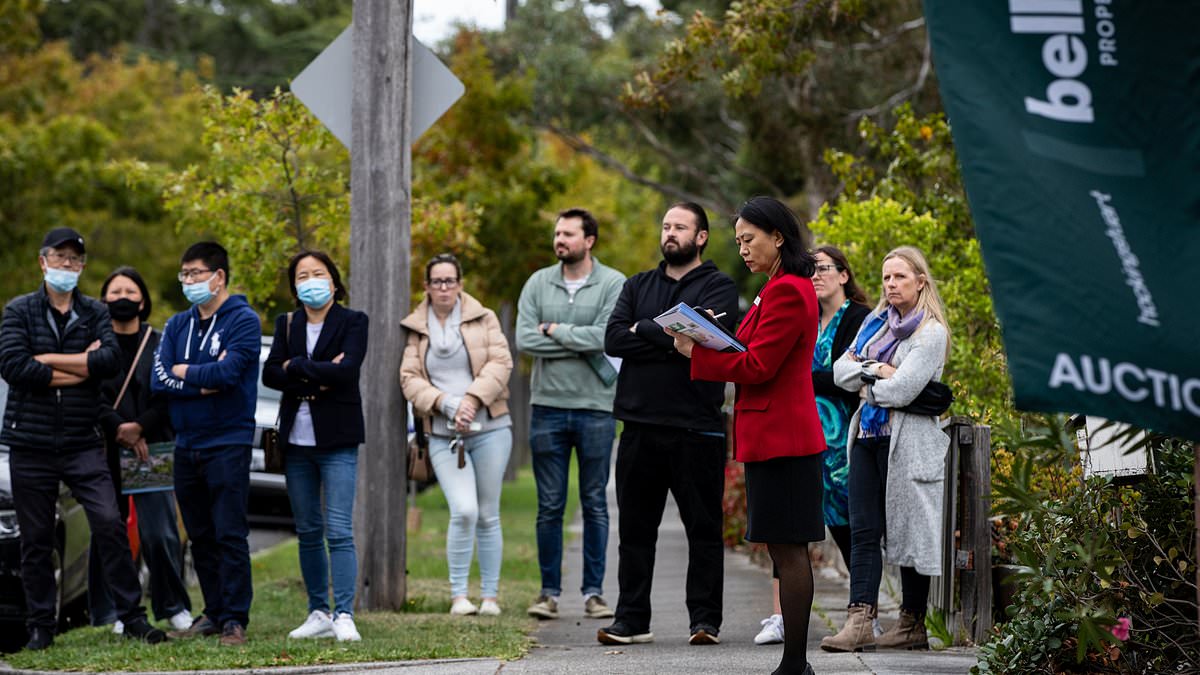Property prices are broadly falling in half of ‘s capital cities as borrowers battle to keep up with soaring mortgage repayments, new data shows.
is now a two-speed property market with home prices falling in a majority of suburbs in four out of eight capital city markets in the three months to August, CoreLogic figures showed.
But in the other four cities, property values are continuing to grow almost everywhere and hitting new record highs.
CoreLogic economist Kaytlin Ezzy said the highest interest rates in 12 years, the cost-of-living crisis and affordability constraints had caused home prices to fall in more suburbs across .
‘While values are still rising at the national level, albeit at a slowing pace, beneath the headline figure, we’re starting to see some weakness, particularly in Victoria,’ she said.
Melbourne is ‘s worst-affected capital city market with 79.1 per cent of suburbs suffering a decline over three months.
Property prices are 1 per cent weaker than they were a year ago despite the big influx of overseas migration.
The median house and unit price of $776,044 is now 4.9 per cent below the March 2022 peak, shortly before the Reserve Bank began hiking rates 13 times.
In the more upmarket Mornington Peninsula area, 100 per cent of suburbs suffered a drop in home values during the quarter.
Victoria is ‘s worst performing property market, following the introduction of a flat $975 investor tax in January.
In Geelong, 97.8 per cent of its suburbs suffered a fall in prices, rising to 100 per cent in Ballarat.
Hobart is ‘s second worst capital city market with 54.3 per cent of suburbs going backwards in the August quarter.
The Tasmanian capital’s mid-point home price of $655,114 is a whopping 12.2 per cent below the March 2022 peak, with prices falling by 1.2 per cent during the past year.
Canberra is another poorly-performing market with 51.6 per cent of suburbs going backwards over the quarter.
The mid-point house and unit price of $845,875 is 6.1 per cent below the peak of May 2022, the month when the RBA raised rates for the first time since 2010.
Darwin, by far ‘s most affordable capital city, saw a price drop in 51.2 per cent of suburbs.
The median home price of $504,367 is 6 per cent below the peak of May 2014.
But at the other end of the spectrum, Perth saw home prices rise in every suburb.
House and unit prices have soared by 22 per cent during the past year to a record $785,250.
The capital of Western is also a beneficiary of large-scale interstate migration, with Perth home prices rebounding during the pandemic after years of stagnation following the end of the mining boom a decade ago.
Brisbane is another strong market, based on interstate migration flows, with only 3.8 per cent of suburbs seeing a decline in value.
During the past year, property values have soared by 15 per cent to $875,040.
Adelaide hasn’t had the same level of interstate migration but just 3.1 per cent of suburbs suffered a price loss over three months.
Home values have climbed by 14.9 per cent in a year to a record high $790,789.
Sydney, ‘s most expensive big city market, saw home values decline in 25.9 per cent of suburbs.
But the median house and unit price has climbed by 5 per cent during the past year to a record high of $1.180million.
Nationally, 29.2 per cent of the 3,655 suburbs analysed by CoreLogic suffered a drop in values in the three months to August.
The Reserve Bank last month kept the cash rate on hold at a 12-year high of 4.35 per cent but Governor Michele Bullock said relief would be unlikely in 2024 from the most aggressive rate hikes since the late 1980s.
